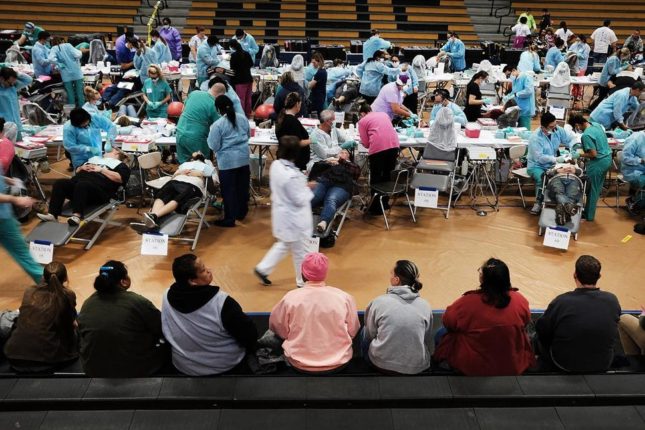Programs that address the health issues of poverty can help students become more empathetic doctors.

Patients living in underserved communities receive care at a mobile dental and medical clinic in Milton, Florida.(Spencer Platt/Getty Images)
At other universities, facing poverty means leaving campus and venturing into the local community. At the Washington University School of Medicine in St. Louis, confronting poverty and its negative health consequences means a bus trip into the least affluent parts of town to see in person what it’s like to be poor on a daily basis.
“We try to present a perspective to our students that puts patients in context so they’re not just viewing them as patients who are non-adherent or not willing participants in the medical encounter,” says Dr. Will Ross, a nephrologist and associate dean of diversity at the Washington University School of Medicine. “The best thing for us to do is not talk about this in a vacuum or a sterile environment like the hospital, but to truly get [students] to understand where our patients live, how they live, and what are the social factors that impact their ability to live healthfully.”
Rather than just poverty voyeurism, the tour involves thoughtful discussion of what the students observe and how things like vacant lots, buildings in disrepair, a lack of grocery stores and broken street lights can impact health and increase stress on people living in those communities. Students also interact with patients and staff at nonprofit organizations and community health centers in some of the poorer neighborhoods of St. Louis. All of these efforts have “remarkable repercussions by improving the physicians’ ability to relate to the patient to provide more sensitive care and improve patient outcomes,” Ross says.
By increasing this exposure, students become “more empathetic medical practitioners,” who are more likely to earn the trust of patients who may be coming from a background that’s suspicious of doctors or medical authorities. It has also led to the creation of a Saturday health clinic staffed by students, who get both hands-on patient care experience and an up-close encounter with the effects of poverty.
To read the full article, click here